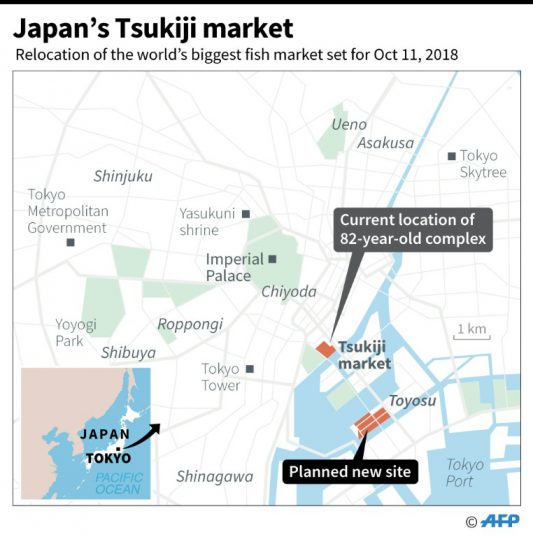After more than 80 years in operation, the world’s biggest fish market, a popular tourist attraction in an area packed with restaurants and shops, will move to Toyosu, a former gas plant a bit further east, on October 11.
The market, which opened in 1935, is best known for its pre-dawn daily auctions of tuna, caught from all corners of the ocean, for use by everyone from top Michelin-star sushi chefs to ordinary grocery stores.
Before dawn, buyers in rubber boots inspected the quality of the giant fresh and frozen tunas by examining the neatly cut tail end with flashlights and rubbing slices between their fingers.
At 5:30 am, auctioneers rang handbells to signal the start of the auction and buyers began a flurry of bidding with hand signals for their preferred tunas.

The Tsukiji market is set to move a few kilometres east
“We have to continue the Tsukiji brand and establish a new brand” at the new site, Shigeo Yokota, the representative of buyers at Tsukiji, said in his New Year speech.
“I’m proud to be standing here at this historic moment,” he added.
The highest bidder paid 36.5 million yen for a bluefin tuna — a threatened species — weighing more than 400 kilogrammes (880 pounds) caught off northern Aomori prefecture, according to the market.
“It’s the best feeling,” Akifumi Sakagami, head chef at a sushi restaurant in the Ginza shopping district which paid for the tuna, told AFP after the giant fish was sliced into several pieces for delivery.
“We wanted to get the number-one tuna at the first auction of the year at Tsukiji… because this is the last New Year auction,” he said, adding that the restaurant owner had a budget of 100 million yen ($886,000).
“Tsukiji is the world’s number-one fish market. It’s in a very convenient location. It’s sad that it will be closed down,” Sakagami said.
– ‘Tuna king’ –
Kiyoshi Kimura, known as Japan’s self-styled “Tuna King” who in 2013 paid a record $1.8 million for a bluefin, snapped up a 190-kilogramme fish at Friday’s auction for around 30 million yen, the highest price per kilogramme.
Kimura has built his successful Sushizanmai chain into a national brand by paying big money at Tsukiji’s first auction every year.
At the first auction of 2017, he paid more than $600,000 for a 212-kilo bluefin tuna.
President of sushi restaurant chain Sushi-Zanmai, Kiyoshi Kimura, known as the tuna king, displays a 190-kilogram bluefin tuna
The Tsukiji market handles 480 kinds of seafood worth $14 million daily — as well as 270 types of fruits and vegetables — and has fed Japan’s hunger for fresh seafood since its opening.
But in recent years the antiquated facility has prompted its users, such as seafood wholesalers, to voice concerns about its earthquake resistance, sanitation and fire safety, as well as the structure’s use of asbestos and its crumbling walls.
They have also called for upgraded technology, such as better refrigeration systems.
However, the move, originally slated for late 2016, also faced loud opposition from various businesses that operate at or around the market, an extremely popular attraction located conveniently within walking distance from the Ginza district.
Many businesses were emotionally attached to the Tsukiji brand as well as the location, which had problems with soil contamination as it used to house a dry cleaning plant before the market was built.
Governor Yuriko Koike, a former TV anchorwoman, put the relocation plan on hold shortly after being elected Tokyo’s first female governor in 2016.
The relocation plan had faced loud opposition from various businesses that operate in or around the market, an extremely popular attraction within walking distance from the Ginza shopping district
She then found a series of problems with the new site in Toyosu, including soil and groundwater contamination as well as the discovery that contractors had inexplicably failed to fill in a basement at the new site with clean soil as a buffer against underground pollution.
The local government paid hundreds of millions of dollars to clean up the new facility and Koike took the final decision to move the market last month, ending years of delays.
Tsukiji’s wholesalers had voiced frustration over the delay, arguing that postponing the move was costing them millions of dollars a month.
Download our app and read this and other great stories on the move. Available for Android and iOS.